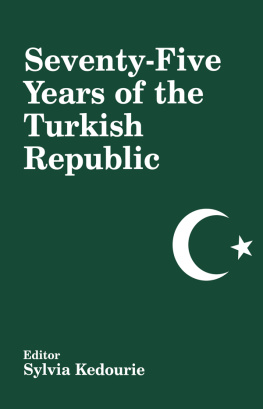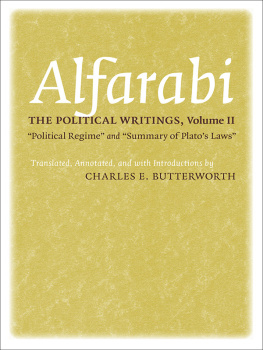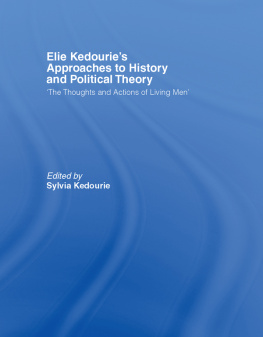First published 1974 in Great Britain by
FRANK CASS AND COMPANY LIMITED
2 Park Square, Milton Park, Abingdon, Oxon, OX14 4RN
and in United States of America by
FRANK CASS AND COMPANY LIMITED
270 Madison Ave, New York NY 10016
Transferred to Digital Printing 2005
Copyright 1974 Elie Kedourie
ISBN 0 7146 3041 1
Library of Congress Catalog Card No. 7393193
All Rights Reserved. No part of this publication may be reproduced in any form or by any means, electronic, mechanical, photocopying, recording or otherwise, without the prior permission of Frank Cass and Company Limited in writing.
Preface
This book constitutes the continuation and complement of a work, The Chatham House Version and Other Middle-Eastern Studies, published in 1970. Both works are concerned with certain themes prominent in recent middle-eastern history, namely the influence of great-power, and particularly British policies in the region; the character of middle-eastern, and particularly Arab, politics and political thought during the last hundred years or so; and the fate of so-called minorities, and particularly the Jews of the Arab world, caught as they were in the cross-fire of antagonistic ideologies and of international conflicts. While in the earlier work the theme of British attitudes and policies loomed largest, the major theme of this book is the failure of constitutionalism in the middle east during the last hundred years or so, the transformation of a native tradition of autocratic rule into a European-style absolutism, and the increasing radicalization of political thought which accompanied this transformation. There is no doubt that the conflict in Palestine between Zionism and Arab nationalism has greatly contributed to this radicalization, and Palestine is the focus on which converge the two other minor themes of the work, British policy, and the fate of the Jews in the Arab world.
The nineteen chapters which make up this book were written over the last ten years or so. are published here for the first time. Details of earlier publication in respect of the other chapters follow:
incorporates parts of a chapter on The Middle East 19001945 contributed to The New Cambridge Modern History, volume xii: The Shifting Balance of World Forces 18981945, 2nd edition, 1968.
is based on an article, Hizb: the Arab Lands, contributed to The Encyclopaedia of Islam, new edition.
appeared in Middle Eastern Studies, vol. 3 no. 1 (October 1966).
appeared in The Jewish Journal of Sociology, vol. ix no. 1 (June 1967).
appeared in Middle Eastern Studies, vol. 9 no. 1 (January 1973).
appeared in The Jewish Journal of Sociology, vol. vi no. 2 (December 1964).
appeared in Middle Eastern Studies, vol. 8 no. 2 (May 1972).
appeared in The New York Review of Books (23 November 1967).
appeared in Art International and The Lugano Review, vol. xvii no. 4 (April 1973).
appeared in Encounter, vol. xxxix no. 5 (November 1972).
appeared in The U.S.S.R. and The Middle East, edited by M. Confino and S. Shamir and published by Wiley, 1973.
appeared in The Arab-Israeli Dispute, published by the Institute for the Study of Conflict, 1971.
appeared in Middle Eastern Studies, vol. 2 no. 2 (January 1966).
appeared in Middle Eastern Studies, vol. 6 no. 3 (October 1970).
appeared in Middle Eastern Studies, vol. 7 no. 1 (January 1971).
appeared in Middle Eastern Studies, vol. 7 no. 3 (October 1971).
appeared in Middle Eastern Studies, vol. 2 no. 4 (July 1966).
I am most grateful to the editors and publishers of the publications listed above for kindly allowing republication in this book. Crown copyright records appear by permission of the Controller, Her Majestys Stationery Office.
I am greatly obliged to the Central Research Fund of the University of London and to the Government Research Division of the London School of Economics and Political Science for enabling me to obtain books and documents not available in this country, and to the Warden and Fellows of St. Antonys College, Oxford for having made it possible for me to consult documents in the National Archives, Washington.
I would also very much like to thank the staffs of the Public Record Office, London, of the National Archives, Washington, and of the Archives du Ministre des Affaires Etrangres, Paris for their constant and ready helpfulness.
London School of Economics and Political Science E.K.
February 1974
1. The Fate of Constitutionalism in the Middle East
Constitutional government is usuallyand rightlysaid to originate in western Europe, where it is the distantand quite unforeseenoutcome of the militarization and barbarization which overtook, after the ninth century, the settled and prosperous lands of the western Roman empire. Constitutional government may be described as limited government, or as a government of checks and balances, or as representative and responsible government; again it may be associated with the existence of various powerful and substantial interests in society which other interests are powerless permanently to suppress, and which the government is not in a position to destroy. But however constitutional government is described, and whatever the particular social structure with which it may be associated, we may safely say that it is far removed from, if not antithetical to, what usually obtains in oriental despotism where the ruling institution is subject to no control by the subjects and where, to use Wittfogels formulation, the state is stronger than society.
Oriental despotism is the rgime which most of the middle east has traditionally known; more precisely the term may serve to describe the Ottoman empire and its military and administrative institutions, which were at their most efficient during the sixteenth and part of the seventeenth century. Whatever may be said about Ottoman society at large, there can be no doubt that these institutions at the end of the eighteenth century were manifestly in decline. This decline meant, in particular, that the hold of the sultan and his servants over large areas of the empire became weak, and there arose in the provinces powerful interests which were not amenable to central control. Whether ayans and derebeys in Rumelia and Anatolia, or mamlukes in Baghdad and Cairo, or local potentates like Jazzar of Acre, Zahir al-Umar of Nablus, or Ali Pasha of Janina, one may compare them, without being seriously misleading, to those feudal barons of western Europe who, in retrospect, are seen to have shared in the making of a society in which constitutional and limited government could function and have reality.
In fact, the decay of the Ottoman ruling institution and the growth of provincial and local interests able to assert themselves resulted, on one occasion, in a state of affairs which again bears some resemblance to the politics of feudal Europe. Shortly after the accession of Turkish historians have likened the sened to Magna Carta, and provided that this is taken to be no more than an analogy, it is not seriously misleading.











